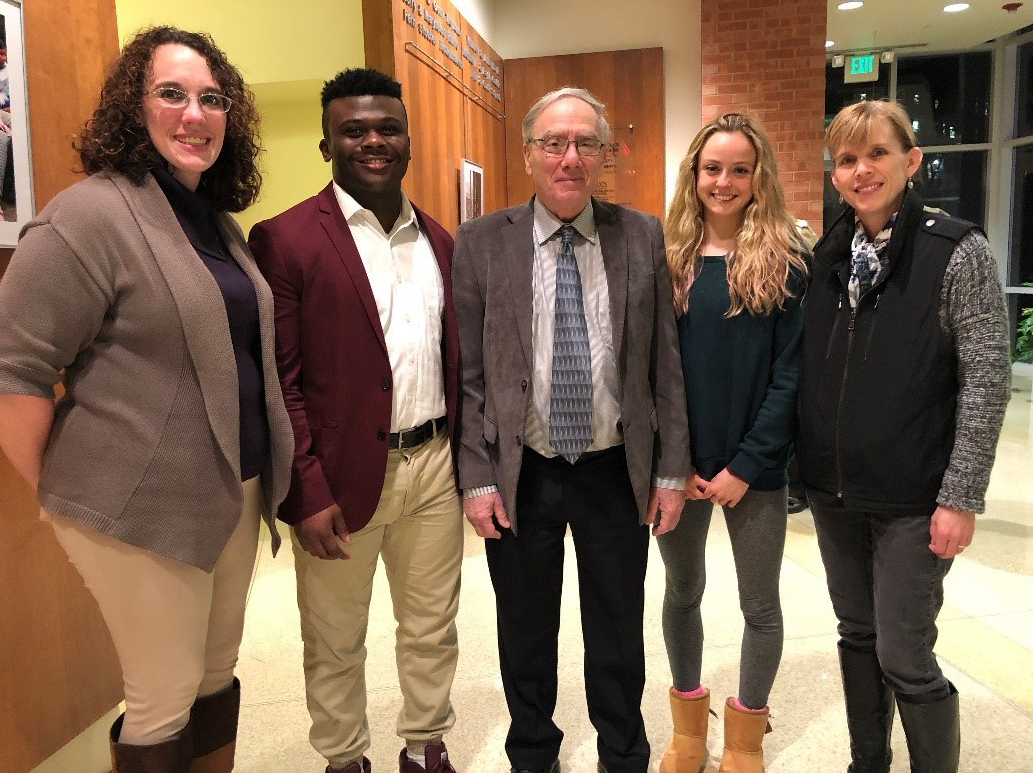
By Magdalena Knapp, Editor
“Knowing that Mrs. Mallard was afflicted with a heart trouble, great care was taken to break to her as gently as possible the news of her husband’s death.” (Kate Chopin – “Story of an Hour”) – You can hardly introduce a short story with a better sentence than this, in my opinion. This sentence makes you curious, wants you to continue reading and to discover more about Mrs. Mallard, the death of her husband and how she is going to live with it. Curiosity – this has been Dr. Mario Livio’s field of interest for the last five years.

Dr. Livio shook my hand with the heartwarming words “La vita è dura” (Italian for “Life is hard”) and introduced himself to me before his big speech. “I’m not actually Italian,” he says, “but people think it because of my name, so I might as well take advantage of it.” This was the first time I have ever spoken to Dr. Mario Livio, and his sense of humor and Israeli accent already earned him quite a few brownie-points in my Italian heart. Continuing our conversation, he said, “Italian food is my favorite, I had it a couple of months ago when I was in Genova!” and my heart completely belonged to him. Dr. Livio is a very nice grey-haired man with a brilliant mind, who loves to joke around and talk to people who attend his speeches.
Dr. Mario Livio is an astrophysicist from Israel, but he has lived in America for many years. The Hett – Center of the Arts at McKendree University had the honor to host one of his speeches on Wednesday, February 21. The high number of attendees, mostly students, (and only some of them were there for extra-credit) showed how much interest Dr. Livio already sparked. Mr. Livio’s speech was mainly about his newest book titled “Why?” and the topic discussed within: Curiosity.

To launch his speech, Dr. Livio gave us a brief summary of people throughout history that were, according to him, very curious. First up was, of course, the one and only Mr. Leonardo Da Vinci: creator of the Mona Lisa, and the incarnation of curiosity. Da Vinci spent most of his lifetime dissecting and exploring dead bodies. Da Vinci was interested in everything, except politics, which was good, because he lived at the time of the Borgias and they silenced everyone who was interested in politics. Another example of curiosity is Richard Feynman, an American theoretical physicist known for his work in the path integral formulation of quantum mechanics, the theory of quantum electrodynamics, and the physics of the superfluidity of supercooled liquid helium. He also contributed to studies in particle physics for which he proposed the parton model; in short, he was a smart a** man. And of course Kate Chopin, an American author from the 19th century, who wrote many popular short stories such as “The Story of an Hour”.
Dr. Livio has a great and dry sense of humor, which made his speech even more interesting and charming. He did not avoid, as students would say, ‘roasting’ some of the greatest minds in human history. When he talked about the Brothers Grimm, who according to him wrote “a bunch of horror stories for little children” to scare their curiosity with “a cannibalistic witch”, the whole audience burst into laughter. Wrapped into jokes and anecdotes, Dr. Livio satisfied the audience’s thirst of knowledge about curiosity. He explained that humans are curious about the known unknowns, not about the known knowns, nor the unknown unknowns – only about the known unknowns. “We want to know what we do not know yet, but we have to know a little bit about it,” explains Livio. According to him, we have to find the right balance between curiosity and knowledge.
Dr. Livio also explained that no one has to be a genius to be curious. Everyone can be curious in his or her own way, you do not need a degree of some kind. Some of the greatest minds in history were dyslexic, but Dr. Livio said, “If you are the first person to write about something, because you were curious and made a new discovery, you do not have to read that much.” He also encouraged parents to make their children curious. Parents should start with something that they already know their child is interested in and keep going from that point on. Also, according to him and some studies he has done, curiosity of children gets bigger if something is different from their theory – then they will start thinking about it more.
Mr. Livio ended his presentation with a quote from Leonardo Da Vinci: “Blinding ignorance does mislead us. O! Wretched mortals open your eyes!” I really enjoyed Dr. Mario Livio’s speech. He had the right mixture between humor and seriousness, with a lot of knowledge and a pinch of sarcasm. I would suggest anyone who is curious about curiosity to buy his book “Why?”

Nicely done, Magdalena. You captured the essence of Dr. Livio’s expertise and personality very well. I’m glad that so many people had a chance to see him in person. Others will delight in reading your article.
Great review!!! You did a great job!